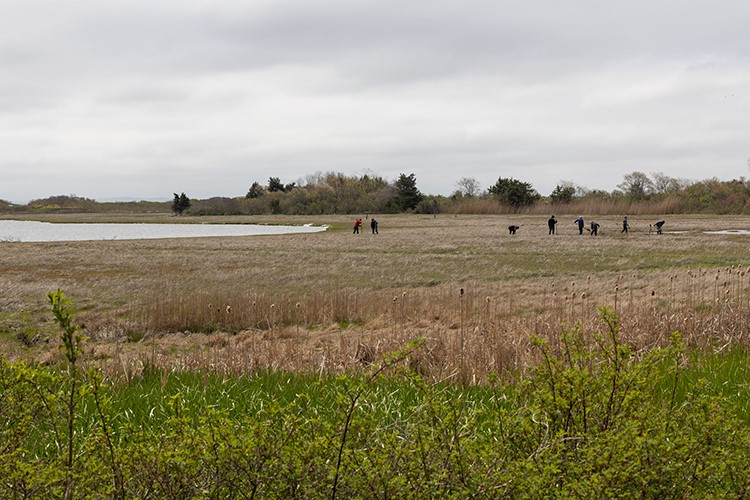Visitors to Allens Pond Wildlife Sanctuary may be curious if they spot groups of individuals digging on the sanctuary’s salt marsh.
Under the watchful eye of Mass Audubon’s Coastal Resilience Program the South East team is carving out runnels, shallow channels used to improve waterlogged conditions on the salt marsh by lowering the water table and draining impounded water.
Climate-related increases in sea level have shown that incoming tides are higher and lasting longer, causing upland areas of the marsh to be flooded more frequently, resulting in the formation of saltwater pools (water impoundments) that remain even when tides recede.
These water impoundments are having a disastrous effect on the high-marsh ecology, including vegetative die-off and habitat loss. As they literally drown in place, we lose essential salt marsh services such as protection against floods and storms—and as marshes degrade they can release stored carbon and greenhouse gases, contributing to climate change.
Along with our partners at Save the Bay, Bristol County Mosquito Control, Dartmouth Natural Resources Trust, and the U.S. Fish and Wildlife Service, we are utilizing narrow, strategically placed runnels to drain excess sea water into preexisting ditches or creeks that flow into open water. This strategy alleviates stresses on these habitats, which is crucial to the long-term viability of the plants and animals that rely upon them.
For example, Saltmarsh Sparrows are now extremely vulnerable as their nests within the high marsh are more frequently inundated by incoming tides, as sea level rises.
Creating runnels can be an effective nature-based climate solution, rather than constructing extensive and costly sea walls that further erode the salt marsh.
We hope to use this salt marsh restoration technique and others at additional coastal sanctuaries, including Great Neck in Wareham, Barnstable Great Marsh in Barnstable, Wellfleet Bay in Wellfleet, and Rough Meadows in Rowley.
Stay Connected
Don't miss a beat on all the ways you can get outdoors, celebrate nature, and get involved.




